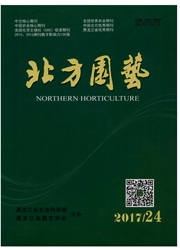

 中文摘要:
中文摘要:
以从白菜软腐病根部土壤分离获得的1株能拮抗细菌性软腐病的拮抗真菌为试材,以平板对峙培养其抑菌圈达(37.7±2.2)mm,白菜离体叶片防效可达75%,依据形态特征结合rDNA-ITS序列分析,将获得的拮抗真菌鉴定为草茎点霉,并命名为Phoma herbarum F217-1,并研究了其生物学特性。结果表明:该菌株在马铃薯蔗糖培养基(PSA)上生长最佳,碳源和氮源以葡萄糖和硝酸钠较适宜,生长适温为28℃,致死温度为55℃,在pH 3~10条件下均生长良好,其最适pH 5~8,通气条件对草茎点霉菌丝生长均无明显影响,但光照24h条件下菌丝生长较差。
 英文摘要:
英文摘要:
A strain was isolated from soil of cabbage root which could antagonize soft rot diseases through bactericidal test and fermentation culture method.Its anti-bacterium-circle was(37.7±2.2)mm.Detached leaves experiment showed that its control efficienty was 75%.Following morphological characteristics,combining with the result of the rDNA-ITS sequence analysis,it was identified as Phoma herbarum and named Phoma herbarum F217-1.The results indicated that the F217-1grown well in PSA under 28 ℃,and the lethal temperature was 55 ℃.Although the mycelium could grow between pH 3-10,pH 5-8were appropriate.Glucose and NaNO3 were the suitable carbon and nitrogen resource,respectively.Ventilation had no significant effect on the growth of penicillium mycelium,but the 24 hours light was not benefit for the mycelia growth.
 同期刊论文项目
同期刊论文项目
 同项目期刊论文
同项目期刊论文
 期刊信息
期刊信息
